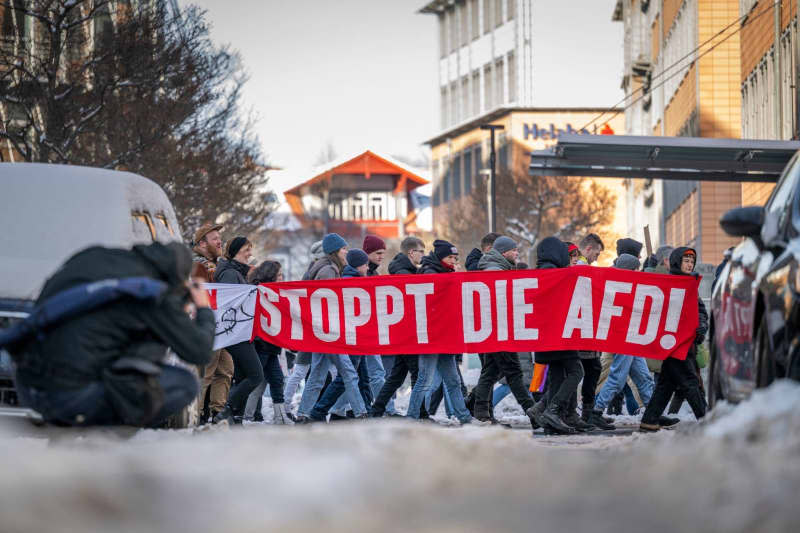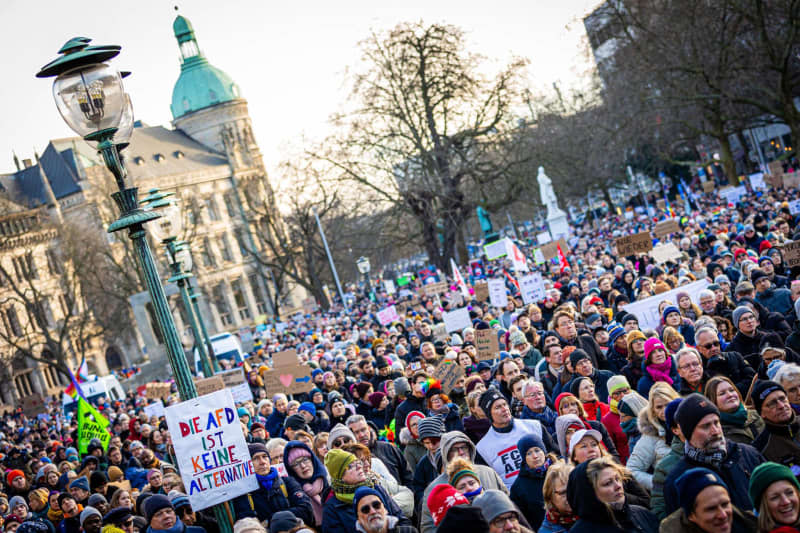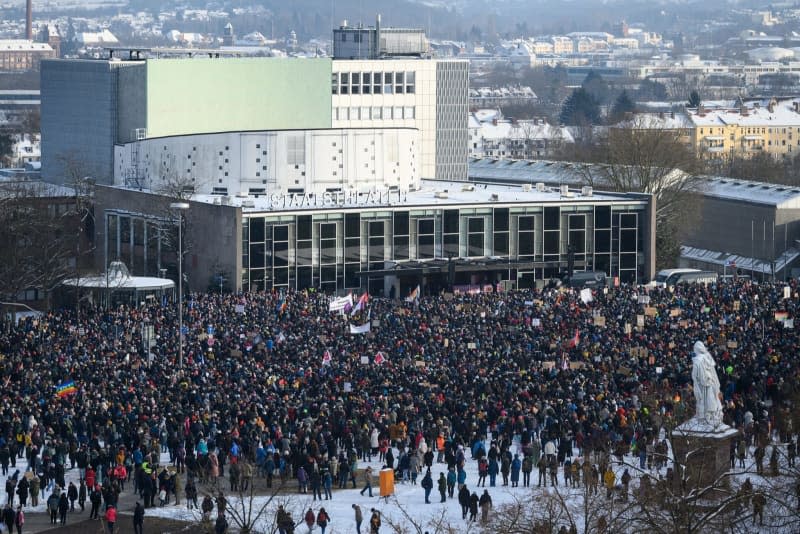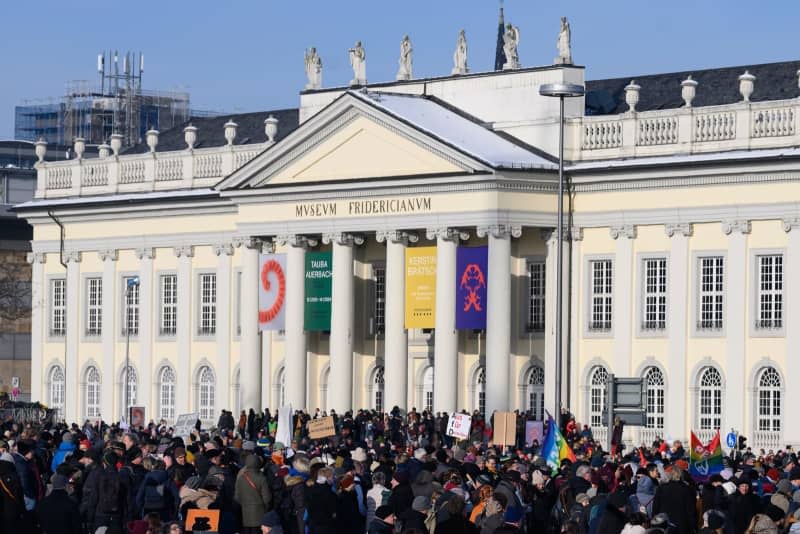Some 300,000 protest in Germany against far-right and for democracy
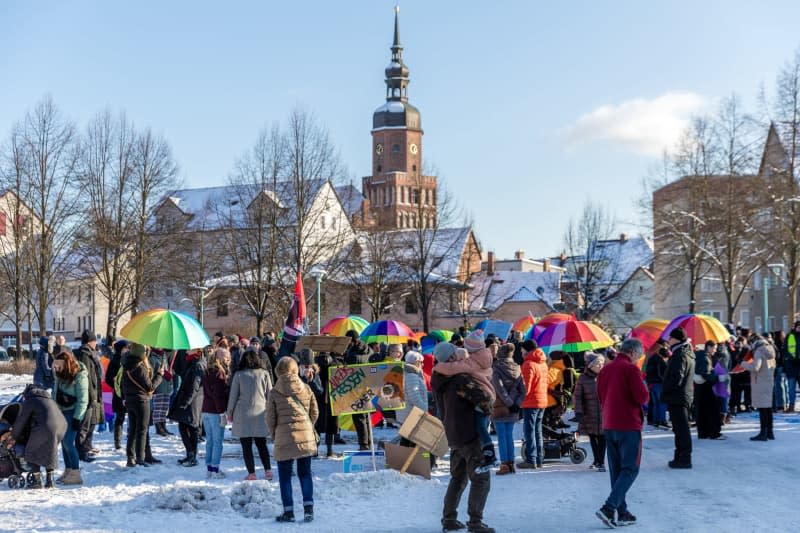
- Oops!Something went wrong.Please try again later.
At least 300,000 people took to the streets of Germany on Saturday to voice their opposition to the far-right Alternative for Germany (AfD) party and to support democracy.
The protests took place from the south in Bavaria to the northern city of Hamburg and from western cities such as Frankfurt to Erfurt and Haale/Saale in the east, where the AfD is backed by some 30% of the electorate, according to recent surveys.
Even on the North Sea island of Sylt, a popular holiday destination for Germany's rich and wealthy and not known as a hotbed of political activism, some 600 people protested against the far-right, according to police.
Demonstrators held up signs saying "Facism is not an alternative" and "No place for Nazis."
Representatives of trade unions, associations, the Greens and Chancellor Olaf Scholz's Social Democratic Party (SPD) in particular had called on people to take part in the protests.
Tens of thousands more are expected on Sunday when other cities, including the capital Berlin, have mass protests scheduled.
The strong turnout follows a report from the news outlet Correctiv which revealed that AfD politicians held a meeting with far-right extremists in November in Potsdam near Berlin. Members of the conservative Christian Democratic Union (CDU), the largest opposition party, also attended.
The report has caused an uproar in Germany, where there is mounting dread among mainstream political parties about the surge in public support for the AfD. The party is riding high in the polls of three former East German states that hold regional elections later this year.
At the Potsdam meeting, far-right extremists discussed topics like "remigration," a term frequently used in far-right circles as a euphemism for the expulsion of immigrants and minorities, including those who are naturalized German citizens.
The meeting's location is just under 10 kilometres from where Nazi leaders held a meeting in Wannsee on January 20, 1942 - exactly 82 years ago. There they coordinated the implementation of the "Final Solution of the Jewish Question," and discussed the systematic murder of up to 11 million Jews in Europe.
Saturday's protesters were clear that they do not want the country to return to its Nazi past.
In North Rhine-Westphalia, Germany's most populous state, state Premier Hendrik Wüst from the CDU thanked those who came out to demonstrate against right-wing extremism and called for an "alliance of the centre" across all parties and levels of government.
"We need the democrats to stand shoulder to shoulder," he said. Wüst labelled the AfD a "dangerous Nazi party" that is not grounded in Germany's constitution.
In Frankfurt, the country's financial capital, police put the number of protestors at around 35,000. A police spokesman described the atmosphere as peaceful.
The protests, which have been running for days, have also drawn support from Chancellor Scholz.
A similar protest in Limburg to the north-west of Frankfurt drew 2,800 earlier on Saturday, considerably more than had been expected.
In Hanover in northern Germany, organizers put the number of participants at 35,000, saying this estimate was in accordance with police figures. The police were not initially available for comment.
CDU leader Friedrich Merz described the nationwide demonstrations as encouraging. "The 'silent' majority is raising its voice and showing that it wants to live in a country that is open to the world and free," he told dpa on Saturday morning.
Other crowd estimates from the police or organizers included 20,000 in Stuttgart, 12,000 in Kassel, 30,000 in Dortmund and 10,000 in Wuppertal, 20,000 in Karlsruhe, 18,000 in Heidelberg, at least 10,000 in Nuremberg, around 9,000 in Erfurt and about 16,000 in Halle/Saale.
In Nuremberg one sign read: "All of Nuremberg hates the AfD!" In Kassel, where the 12,000 turnout was 12 times as what had been expected, demonstrators carried signs reading "Nazis and anti-Semites must be expatriated," in reference to the far-right Potsdam meeting's reported plans to kick out immigrants.
Josef Schuster, the president of the Central Council of Jews, welcomed the rallies.
"I am really pleased that the centre of society is standing up," Schuster told the Augsburger Allgemeine newspaper.
The International Auschwitz Committee thanked the demonstrators on Saturday evening.
"Holocaust survivors are more than grateful to all those who are taking to the streets these days against the hatred and lies of the far-right. They see these demonstrations as a powerful sign from the citizens and a revitalization of democracy that they have long hoped and waited for," said Executive Vice President Christoph Heubner.
In remarks on Friday, Scholz termed remigration "an attack on our democracy." He welcomed the protests planned for the weekend. "I say it in absolutely clarity and severity: Right-wing extremists are attacking our democracy," he said.
A mass rally in Hamburg on Friday evening had to be halted on safety grounds, as more people than expected turned out. Police put the numbers at 50,000, while organizers said 80,000 people had attended.
